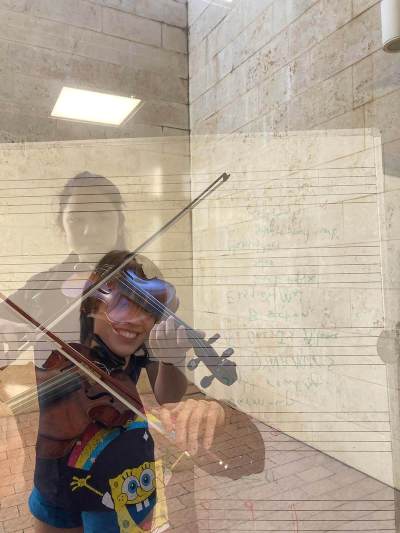Hoa wonders about the mysterious lady who is always playing the violin
The woman had always been there, it seemed from the beginning of eternity, or at least as long as my eight years of memory could recall. Though Mama said she remembered her from when she was my age. But that’s hard to imagine, because my mama has a timeless face. Sometimes I say, “Mama, what is the name of the lady with the violin?” and every time she just smiles and says, “Find out for yourself, menina.”
My name isn’t menina, it’s Hoa. At bedtime, Mama tells me it means “flower.”
School comes and goes. The lady with the violin keeps smiling. One day the lady’s violin is covered in snow, only to have it blown away the next day by spring winds. Her music blooms and flowers. The day after, her music is thick and slow like a hot summer morning. Come fall, her violin plays the sharp winds and crisp apples of autumn.
Winter.
Spring.
Summer.
Fall.
The pattern repeats, and I am twelve.
As I walked to school that day, the violin lady was slouching and not smiling as she usually did, but I didn’t notice anything severely wrong until I passed her again on the way home from school. She was lying on the ground under her usual spot. Her music was rich and soft, but I detected a hint of sadness.

“Are you okay?” I asked, my first words to her my entire life.
She smiled as I helped her up. “You’re sweet, menina.” How did she know the gravity of those words?
Touched, I asked again, “Are you okay?”
“That’s the problem, my sweet. I have little time left on this earth,” she said peacefully. “I see you’re the one to carry on my position as orchestrator of the seasons, the sun, and the moon. It means more than simply that—it means you can begin to understand what life means to you. At first it seems internal, but without knowing it, you will affect others—similar to how I am changing you, slowly. Write,” she said.
I couldn’t say anything, and she didn’t either. She just looked at me, eyes full of knowledge, as the music—playing the wise, soft, spring winds, soft, soft, soft—slowly faded. And her eyes shut with her last breath as the last breeze of spring left. And suddenly, it was as still and silent as a summer day. I never did ask her name.
Years passed, and without seasons. I had children who grew. Every once in a while I would tell them about the violin lady, and how she had told me strange things and passed on her legacy to me. Even though I never admitted it, twenty years of possessing the violin lady’s legacy hadn’t changed me or the people around me. I was starting to wonder what this legacy was really about.
One day my son asked me what I had done with the gift the violin lady had given me. For that, I was at a loss for words. I couldn’t recall a single thing I had done. So, that day, I picked up a pen and put it to paper—nothing came. But as the days continued to come and go, I began to remember the way the seasons had made me feel, and soon I found myself with a pen to paper once more. I wrote about the orchestra of the seasons, and how they reflected anger and happiness, love and loss, life and death.
“Years passed, and without reason”
And slowly, through writing, I began to change myself, and soon the seasons were back, and so was the music!
I wrote and grew, so—
Now I knew what it was like to be the orchestrator of seasons, to tell my children what I had done with my legacy. Now it wasn’t the violin lady’s legacy. It was mine. And even though I never played a single note, I realized that her music and my writing were the same thing. Both kept the music alive.

